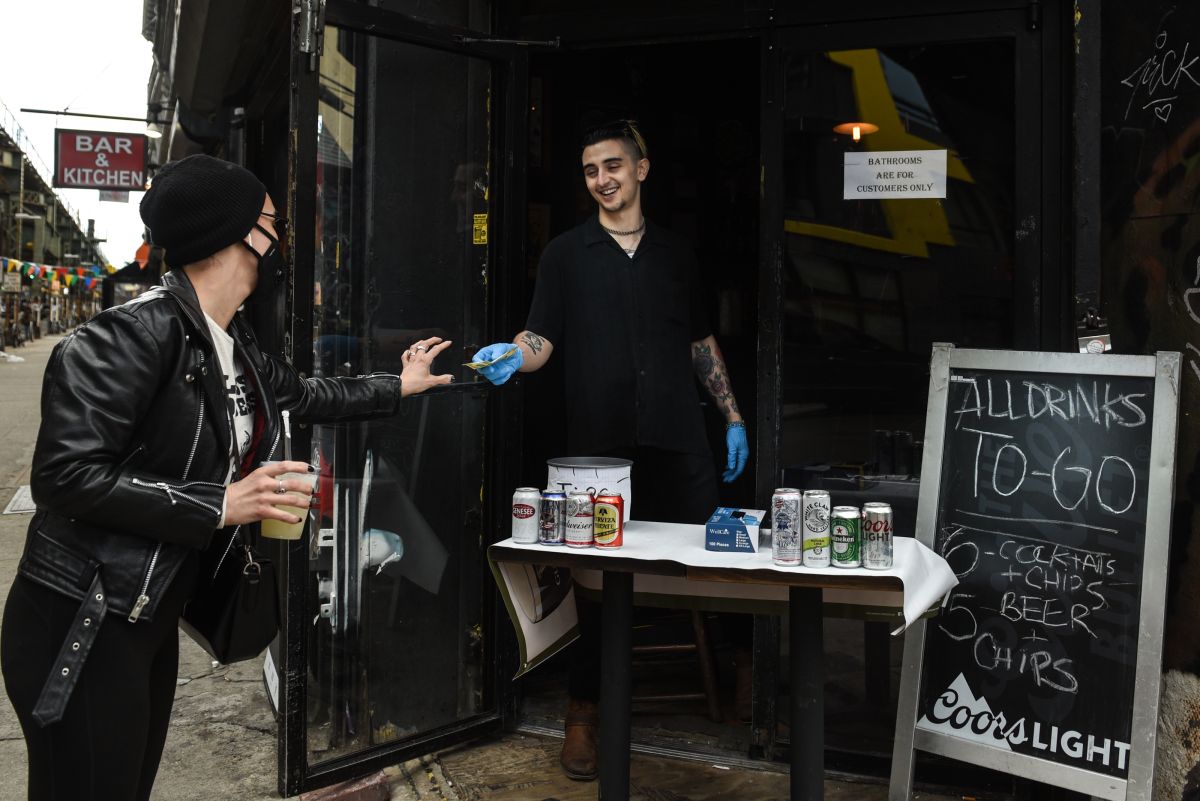The popular ‘to-go drinks’ plan that was put into effect during the COVID pandemic-19 to help keep bars and restaurants afloat in New York with the sale of alcohol without customers having to consume inside the premises, it could become a permanent measure by law, something that was approved this Wednesday good from Governor Kathy Hochul.
The state president announced new efforts by her Administration, included in her state budget proposal, to support the recovery of small businesses and the hospital industry in general, including streamlining the State Liquor Authority (SLA).
“New York’s nightlife and hospitality industry is second to none, and our state cannot truly recover from this pandemic until we reinvigorate this crucial sector of our economy and the hundreds of thousands of jobs it generates,” said Go bernadora.
Regarding the drinks to go, Hochul highlighted that his budget also proposes, as a key part of his billion-dollar rescue plan for small businesses, passing legislation to make it permanent for restaurants to be able to sell those to-go drinks again. “This policy provided a vital economic lifeline for our bar and restaurant industry during the pandemic, and reinstating it, with the appropriate limitations, will help ensure those businesses recover and prosper.”
The Director NYC Hospitality Alliance executive Andrew Rigie stressed that New York’s restaurant industry has been devastated by the pandemic, and “that’s why smart policy like the temporary liquor license law is helping small businesses.” to open much faster while creating new jobs, which is why you need to reinstate the popular take-out policy that provides struggling businesses with a significant stream of revenue while giving New Yorkers what they want, which is wine and cocktails to take away, sold in their favorite restaurants and bars”.
Another proposal
Hochul also proposed to modernize and streamline the operations of l to SLA, something of great importance since this is the agency in charge of supervising approximately 70,000 licenses and permits to sell alcohol throughout the state and process tens of thousands of applications annually. Hochul’s budget includes funding a comprehensive review of its decades-old licensing and SLA compliance databases by awarding $2 million in additional funding to that agency.
“The current process requires submitting paper applications to the SLA, then scanning and recording them, before they can be sent to an examiner for review. This and other processes can be handled more efficiently by computer programs,” the Governor highlighted.
The president of the New York State Association of Latino Bars and Lounges, Arelia Taveras, reacted stating that Hochul “is taking real and bold steps to modernize and revamp the State Liquor Authority and strengthen its ability to serve the restaurant and business community with higher staffing levels and the implementation of electronic filing. These measures, along with the proposals in its executive budget for beverages to go and the simplification of the application process, will make a big difference for new and existing restaurants and bars that are struggling to navigate the SLA while trying to stay afloat during difficult times. pandemic”.
The Governor highlighted these proposals and actions at an event at ‘Therapy Wine Bar 2.0’, a Brooklyn business that was able to open thanks to a law signed in December to allow temporary permits for serve alcohol. There, Hochul also announced proposals to update the state’s alcoholic beverage laws and fund operational improvements at the State Alcoholic Beverage Authority to revitalize the state’s multibillion-dollar hotel industry, one of the industries hardest hit by the pandemic.
The SLA in figures :
- 75,000 pending applications currently have the SLA.
- 14,000 are for alcohol sales licenses.
- 30,000 are license renewals.
- 26,14 are for special events.
- 114 employees have the SLA.
- 30 of them, alone mind are dedicated to working on the applications.
- 3,700 Applications are behind schedule.
- Additional $2 million to the budget of the SLA proposed by the Governor.
- 39 full-time employees will be able to contract the SLA with these additional funds.
- 14 to 26 weeks it currently takes time to process the licenses granted by the SLA, and that time will be significantly reduced with these additional funds.
